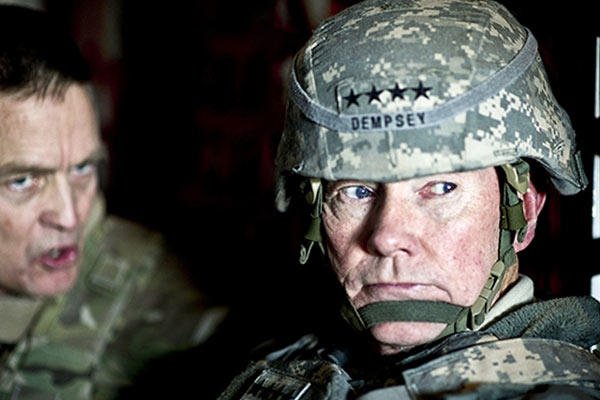Observers should not perceive NATO's order to scale back joint U.S.-Afghan military operations in response to insider attacks as an erosion of U.S. resolve to leave Afghanistan in 2014 and hand over security responsibilities to Afghan National Security Forces, Chairman of the Joint Chiefs of Staff Gen. Martin Dempsey said Wednesday.
“The changes that have been made in Afghanistan are just that. They are tactical changes in response to a changing threat,” Dempsey told a crowd at the Air Force Association's annual conference in National Harbor, Md. “But they are in no way an indication that we have changed our campaign objectives.”
U.S. Lt. Gen. James Terry, the deputy commanding general of U.S. Forces in Afghanistan, issued an order on Sept. 16 restricting training of Afghans to only those units at the battalion level and above. (A battalion in the Afghan National Army is called a Kandak.) The order applies to patrols Afghan and NATO forces have often driven and walked together.
Afghan and NATO commanders can request partnerships with units below the Kandak-level, but those requests must receive approval from a regional commander on a “case-by-case basis,” according to International Security Assistance Forces leaders.
A spike of insider attacks, or attacks executed by supposed Afghan soldiers and policemen, have killed 51 ISAF troops this year, mostly Americans. NATO and Afghan officials have responded by re-examining the vetting process to clear Afghan army and police recruits, and in some cases, freezing training.
Taliban leaders have taken credit for the insider attacks even though NATO leaders said Taliban infiltrators have accounted for only a quarter of them. Ryan Crocker, the U.S. Ambassador to Afghanistan until he stepped down in July, said the figure was actually higher.
Fifteen insurgents executed an attack on Sept. 14 on Camp Bastion in southwest Afghanistan. They killed two Marines including the commander of a Harrier squadron and destroyed six Harrier jump jets.
Taliban officials claimed a military victory over the U.S. when the order to scale back NATO-Afghan joint operations was announced.
"This is the result of the mujahedeen's operations and tactics that forced the enemy to abandon their plans," said Taliban spokesman Zabihullah Mujahed.
The U.S. military's top officer disagreed, saying the order was simply an adaptation to tactics. Dempsey said he doesn't understand why defense analysts have described the success of the insider attacks as a major setback to U.S. strategy in Afghanistan.
Australian Brig. Gen. Roger Noble, a top officer in ISAF headquarters, said that after ten months working in Afghanistan, he trusts his Afghan colleagues, but he still carries a gun. In a briefing to Pentagon press reporters Monday he said the insider attacks do more to erode trust between ISAF and Afghan troops.
“It's one thing to be killed in action fighting insurgents, quite another to be shot in the back of the head at night by your friends,” Noble said.
Dempsey compared the spike of insider attacks to the threat of improvised explosive devices that U.S. forces starting facing in Iraq in 2003. It took some time, but units didn't maintain the status quo when dealing with IEDs, Dempsey said. Ground commanders ordered more foot patrols and the defense industry got busy building Mine Resistant Ambush Protected vehicles.
Much like U.S. forces changed their tactics to avoid IEDs, Dempsey said the U.S. will adapt to insider attacks. The U.S. will not compromise their objectives in response to these attacks from supposed Afghan allies, the Army four-star said.
“To suggest that we shouldn't be adapting to the insider threat is kind of analogous to me to say, okay well, we got IEDS so we should just keep driving down the road and maybe at some point they'll stop blowing them up,” Dempsey said. “This is about adapting. It's not about changing the objectives. But somehow it's being portrayed that way.”
The White House and the U.S. military have no plans to alter their strategy to continue training the Afghan military and withdrawal from the country in 2014, Dempsey said. The path to those goals will not be a straight line and the military will adapt to threats along the way, he said.
“We are deeply committed and resolved to accomplishing the objectives we've established in Afghanistan, principally on the military side, the preparation of the Afghan National Security Force to take control of their security by the end of '14 and we will,” Dempsey said. “But along the way we have to adapt to the reality of the conditions as we find them.”





























